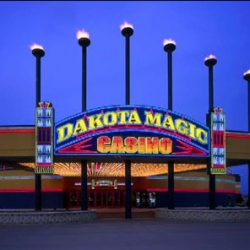A measure to approve the construction of casinos off of North Dakota reservation lands was defeated on Thursday. House Concurrent Resolutions 3033 lost by a 28 to 63 margin, which is seen as a resounding defeat.
More than two-thirds of North Dakota’s state representatives voted against the bill. Proponents noted that six more casinos would generate tens of millions of dollars in tax revenue for the state. Its chief proponent said it would bring a much-needed influx of cash to six rural communities in the state.
Opponents said North Dakota’s casino industry is saturated and cited a law of diminishing returns, in which new and existing casinos would struggle. Mark Fox, a tribal gaming spokesman, said that revenues in existing casinos (and their communities) would be “greatly diminished“.
HCR 3033 Information
HCR 3033 was introduced by North Dakota’s House Majority Leader, Al Carlson, a Republican from the 41st State District. The bill proposed the legalization and taxation of as many as 6 non-state owned casinos to be built on non-tribal lands. Licensing would have allowed private gaming interests, a plan which threatened the tribal casinos in North Dakota.
A coalition of tribal casinos and not-for-profit charitable gaming interests joined to lobby the North Dakota state legislature to vote against the bill. The Three Affiliated Tribes called for “equilibrium” in the state’s casino industry.
Meanwhile, Rep. Carlson downplayed opponents’ concerns that the bill would open the door to out-of-state casino developers. He said no one would build integrated casino-resorts found on the Vegas Strip or other major metropolitan areas. Carlson said, “We are not Las Vegas. We need to have a very controlled environment if we’re going to do this.”
He also repeated his suggestion that the bill would bring prosperity to certain areas of the state which needed an influx of money, as well as steady jobs. The North Dakota House’s leader said, “Is this going to get rid of all our other taxes? Absolutely not. Is it going to boost some of our rural communities? I think it does.”
Al Carlson’s Gaming Bill
Al Carlson added several stipulations to make the bill more palatable to lawmakers. One was an assurance that the casinos would not be located in population centers like Fargo or Bismarck. The other assured that the casinos would be built at least 40 miles away from the reservations.
Those measures were not enough to gain majority support. Having six private casinos in the state would have cannibalized the revenues for the 27 tribal and charitable gaming locations in the state. Many of those establishments are small Mom-and-Pop gaming locations, which would have had a hard time competing against private casinos costing hundreds of millions of dollars to develop.
Required a Constitutional Amendment
House Concurrent Resolution 3033 was a long shot measure in the first place. Even if the bill had been approved, state law requires an amendment to the state constitution. A measure asking for a change to the North Dakota Constitution would have been on the 2018 midterm election ballot.
Similar amendments allowed for the establishment of a state lottery and subsequent multi-state lottery association deals, as well as the establishment of a non-profit charitable gaming network for religious, philanthropic, police, fire, and civic groups. Those forms of gambling are not seen as a threat to Native American casinos.
Mark Fox Praises the Decision
Mark Fox, the Chairman of Three Affiliated Tribes, told the Bismarck Tribune that the decision on Thursday was best for the state. In other regions of the country, market saturation has led to financial troubles for the establishment casino industry. In an increasingly fragmented casino economy, a gaming location has to be reliant more on local gamblers than regional gaming activity. In such cases, only a certain level of gambling activity is reasonable.
Jonathan Jorgensen Expresses Relief
Jonathan Jorgensen, President of the Charitable Gaming Association of North Dakota, also expressed relief that HCR 3033 went down to defeat. Jorgensen said that the people of the state have only so much discretionary money to spend on entertainment and leisure. Had six more large casinos been added to the state, the charitable gaming community likely would have suffered from a drop in revenues. Since those groups view their gaming locations as a form of fundraising for good causes, they wanted the measure to fail.

